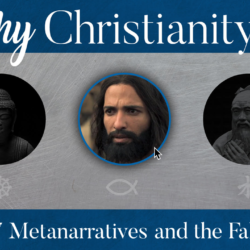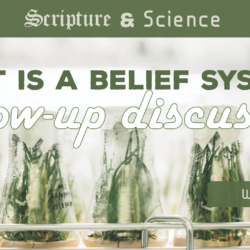
A woman driving on a bridge spots a man standing on the edge, getting ready to jump. Pulling over, she jumps out of the car and shouts, “Stop!”
The man turns and says, “Why should I?”
The lady asks, “Are you religious?”
“Yes,” the man replies.
“Me too. Are you Christian?” she asks.
“Yes.”
Walking towards him, she says, “Me too. Are you Protestant or Catholic?”
“Protestant,” says the man as he begins backing away from the edge, ever so slightly.
“Me too. Are you an Evangelical or a Mainliner?”
He says, “Evangelical.”
“Hallelujah,” she sings out, “Me too! What denomination?”
“Southern Baptist,” he responds.
“Me too!” she shouts as a huge smile spreads across her face. “Are you Reformed or Arminian?”
“Arminian,” the man answers with a grin breaking out. Suddenly the woman’s face falls and with an uncontrollable flash of rage she pushes him backwards and over the ledge. As the man falls to his death, she shakes her fist, yelling, “Die, you heretic scum!” Splash. (Adapted from this video.)
What I find so troubling about this little sketch is not how absurd it is, but the opposite—how it strikes so close to home. Of course, pushing a man to his death is hyperbole, but who among us upon meeting our theological, political, or social foe has not experienced a flash of anger? On the one hand, the more we have in common with someone, the closer we feel to that person. On the other, the differences between us get so amplified that discussing them can lead to sharp schisms. Interestingly enough, this phenomenon is not new. We can even see it play out in the time of Christ. Until the last week of his life, the Romans didn’t worry about Jesus or try in any way to quell his popularity. The Samaritans didn’t follow Jesus around, hassling him wherever he went. The Sadducees didn’t put up much resistance until they perceived him a threat politically after the triumphal entry. No, the group that dogged Jesus the most, popping up in synagogues, grain fields, and villages, was the Pharisees. This was no coincidence, for Jesus’ beliefs and practices were more like the Pharisees than the Sadducees, Samaritans, or Romans. Even though they agreed with him on the great majority of issues, the Pharisees saw Jesus as a serious threat that they needed to resist, expose, and undermine at every opportunity.
I fear we fall into the same way of thinking in our time. Take politics, for example—you probably don’t care too much if someone on the other side of the country voted for the opposite candidates than you did. However, if you find out that someone who shares your overarching ideologies, faith commitments, and way of life has voted for the “wrong” candidates, then that really bothers you. How could they be so dumb? That traitor! This is that same phenomenon of amplifying the small differences among communities where agreement is high. Is this truly righteous indignation we are feeling or something else? What are we to do?
Thankfully, the Bible doesn’t leave us without help on this issue. In fact, getting along with people having diverse ethnicities, cuisines, statuses, incomes, and cultural preferences was a major struggle we can read about in the New Testament. Early Christians began figuring out how to achieve unity from diversity right from the first generation. At Corinth, for example, the church included wealthy and poor, free and slave, men and women, Jews and mostly Gentiles from a variety of occupations. One of the issues we had to solve in those early days was how to handle communion. The wealthy people had control over their time while the farmers, craftsmen, and slaves did not. As a result, at the Lord’s supper, some were drunk while others went hungry. Here is how Paul addressed the problem:
1 Corinthians 11:20-22, 33
20 When you come together, it is not the Lord’s supper that you eat. 21 For in eating, each one goes ahead with his own meal. One goes hungry, another gets drunk. 22 What! Do you not have houses to eat and drink in? Or do you despise the church of God and humiliate those who have nothing? What shall I say to you? Shall I commend you in this? No, I will not…33 So then, my brothers, when you come together to eat, wait for one another
I’m sure the high-status Corinthian Christians felt awkward around lowly day-laborers and vice versa. However, these different kinds of people were now equally members of God’s family where the old barriers and distinctions had been superseded by salvation in Christ. Now, a fabulously well-connected city official would call a lowly latrine-cleaning slave “sister” or “brother” and have a closer bond to that one than to members of his own class. In Christ, there was no longer slave or free, poor or rich, insignificant or honorable—we all became one in Christ (cf. Galatians 3:28). Although this aspect of Christianity seldom gets the attention it deserves, it is our legacy and it’s right there in black in white in the pages of the New Testament. Even so, what about today?
How can we possibly have Christian unity in a world so polarized with black and white issues? Are you for Black Lives Matter or the police? Are you for economic growth or providing assistance to the poor? Are you for illegal immigrants becoming citizens or against? Do you think the government botched the pandemic response or did a good job? On and on it goes. Well-meaning, honest-hearted, serious Christians find themselves on opposite sides of many social, political, and cultural issues. YouTube, social media, the news, TV shows, and advertisers are telling us we cannot have unity without agreement. If the issue is important, then you simply cannot have true friendship, much less fraternal love across the divide. And, of course, every issue these days is infinitely important. We cannot even imagine our opponents are well-meaning. No, they must be the devil of hell himself to hold the other view on such a critical issue! Surely, their Christianity is a farce as is their whole lifestyle, since they disagree with me on something I’m so sure about.

Sadly, technology exacerbates this situation by creating echo chambers for us. Our social media feeds, Google searches, advertisements, and related video suggestions are all catered by the information they’ve collected about us across our web history, age, sex, ethnicity, economic bracket, social media interactions, shopping history, viewing history, and so on. This means that even when you want to hear the other side, your devices are against you. Over time, our online experiences become more and more curated to what the big technology companies think we want rather than what’s out there. This means that when you research a topic, you tend to find confirming information rather than balanced information. I just had an eye-opening experience with this.
Now, I’ll admit that I have a quick trigger finger. No, not for shooting a gun, but for unfollowing people on social media. Someone posts a cat video, I unfollow. Someone carries on in foul language, unfollow. Someone posts seven times in one day, unfollow. I don’t even think about it. It’s an automatic reaction to tame the beast that is my news feed. Having said that, it’s also important to me to have at least one or two strident voices from positions I oppose, so I don’t end up with an echo chamber. The other day, a woman posted about how dumb it was that churches were having services instead of cancelling for the foreseeable future. Immediately I got angry. My sarcastic mind said something like, “So we can go to Walmart and touch the same packages as hundreds of others, but we can’t go to church where the doors are all propped open and only a few dozen are in attendance!?” To make matters worse, she herself is a Christian although from a more traditional denomination. She was saying that there’s no point in having the service since we can’t sing, we can’t greet each other properly, we can’t take communion, and the risk is high as evidenced by the incident in the attached news article. Of course, she was wrong about everything she was saying. We can sing—so long as we wear masks. We can greet each other—so long as we don’t hug or shake hands. We can do communion—so long as we don’t all touch the same items. She pushed my buttons just where I’m most sensitive. As soon as I felt my anger elevator rising, I found my finger tapping a couple of choice icons on my phone and within a second or two, I had unfollowed her. Sayonara, sucker! I could still interact with her directly if I wanted to, but her filthy drivel was no longer going to clog up my feed and aggravate me ever again. But then, the next day I was trying to think of someone vocal who represented her viewpoint on social media, and I realized I didn’t have anyone else like her. To be sure, quite a number of my friends hold her views, but they don’t post about it. Although I strongly disagree with her and find her position not only logically incorrect but offensive, I decided to go back and refollow her so that I wouldn’t close myself off to the other side on that particular issue. I did this for several reasons.
1 First of all, this is a gospel issue. How can I hope to fulfill the great commission our Lord gave us just before he ascended, if I despise my neighbor? The most famous verse in the Bible tells us that God so loved the world that He gave His one and only Son (John 3:16). Wow! Let those words sink in. He loved our sin infested, rebellious, prideful world. How could He do that? How can someone love murderers, rapists, child abusers, and drug dealers? He loved so much that He gave His only Son! This was no mere lukewarm love. No, His love was so massive, He gave the only one who ever obeyed Him perfectly. And, He wasn’t loving only good people or people’s potential if they changed. No, He loved us “while we were still sinners” (Romans 5:8). We were His enemies, and He desired in His outrageous mercy and incomparable love to reconcile us back to Himself. This is grace. This is how God is towards the wicked, not wishing they would die, but that they would turn and live (Ezekiel 18:23, 32). In fact, God doesn’t wish that “any should perish,” but wants everyone “to be saved and to come to the knowledge of the truth” (2 Peter 3:9; 1 Timothy 2:4). Thus, if I’m going to be an imitator of God, I too must walk in love—the same kind of love demonstrated in Christ giving himself up for us (Ephesians 5:1-2). This is step one. If I hate my ideological enemies, I will not carry out the great commission.
2 Secondly, how can I hope to portray Christ to my neighbors if I don’t understand their longings, sensitivities, and fears? I’m not saying we need to be experts in how unbelievers think, but we should at least get a sense of where they’re coming from. The Apostle Peter commanded us to “always be prepared to make a defense to anyone who asks you for a reason for the hope that is in you; yet do it with gentleness and respect” (1 Peter 3:15). If I’m so riled up by someone disagreeing with me that I’m ready to kill, how can I express gentleness? If I think someone’s view is utterly stupid—so dumb a child could see through it—then how can I show respect? If I don’t know where someone is coming from, how can I help that person make sense of the hope that is within me? Now, I realize it’s annoying to expose ourselves to people with whom we have strong disagreements, but in a polarized society, what other options do we have? Are they going to see through the spin in the media and give us the benefit of the doubt? Are they going to listen to competent Christian experts giving a solid defense of our faith when they’re already convinced we’re just a bunch of primitive wingnuts? Are they going to pick up a Bible and read it when they’ve been told it’s full of homophobic bigotry and anti-scientific fairytales? No. We know better than to hold our breath, waiting for the world to come to us. We must go to them. We are the ones Jesus commissioned, not them. If we are to be faithful to our Lord, let us become good listeners with thick skins. Let us tap into God’s extravagant love, already poured into our own hearts, so that it flows out in our words and deeds—especially when our enemies dismiss, marginalize, and persecute us.
3 Thirdly, we have a major public relations problem. Now, to a large degree, we expect the world to be suspicious of us, disagree with us, and even outright hate us. “Indeed, all who desire to live a godly life in Christ Jesus will be persecuted” (2 Timothy 3:12). We can’t control how the world perceives the gospel message, the Bible, or our ethics. These matters are largely out of our hands. However, we can control how we treat each other. When unbelievers encounter Christians who are talking trash about other Christians because of ideological differences, what does that say? If outsiders see us fighting with each other over the same issues and in the same way as the world, doesn’t that compromise our testimony? If saved people act like unsaved people, what’s the point of getting saved? No, we are the people of love. Jesus said they will know we are his disciples by our love for one another (John 13:35). This is where it must begin.
How can you learn to love a sister or brother who thinks differently politically, environmentally, economically, etc.? How can you prioritize your faith bond over your other differences? What is primary in your heart? I’m sure most of us would immediately say, God is first and then everything else, but our reactions and sensitivities may tell a different story. Do you feel a stronger bond to a patriotic atheist who shares your politics over a Christ follower in Europe who hates the USA and believes in socialism? Does salvation in Christ trump all other issues or not? Is what Christ has done that big in your heart? If so, then regardless of other differences and disagreements, since we all were made to drink of one spirit, we are all one body (1 Corinthians 12:13). Love binds us together in perfect harmony so that the peace of Christ can rule in our hearts (Colossians 3:14-15).
As Christians, we are going to disagree with each other about many important issues. This is good—difficult and annoying, but good. If we all adopted a cult mentality and agreed on everything all the time, how could we show the world God’s amazing grace and astonishing love? As Jesus said, “If you love those who love you, what reward do you have? Do not even the tax collectors do the same?” (Matthew 5:46). No, if we will live out the true love of God, then it will find its most powerful expression when it reaches over enemy lines and binds together people who have nothing else in common. And if the world sees that, you better believe it will get their attention!









Just like in war Christians inevitably end up killing other Christians; in politics Christians end up voting against other Christians.
Yet, many justify voting by the age-old moniker: the lesser of two evils.
But the core words in that statement are: “I vote for evil”!
And the Bible, as we know, repeatedly warns us to “Stay away from every form of evil.”
So may I humbly offer the following food for thought:
A No Vote for the kingdoms of this world, i.e., their kings and lords means
A Yes Vote for the coming Kingdom of God and the king of kings and lord of lords!
May God grant us the wisdom to discover right.
The will to choose it.
And the strength to make it endure.
christenemylove.com